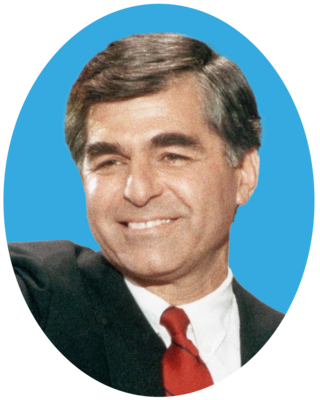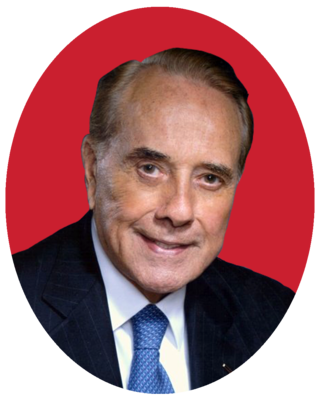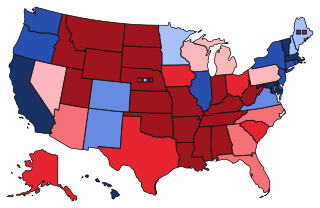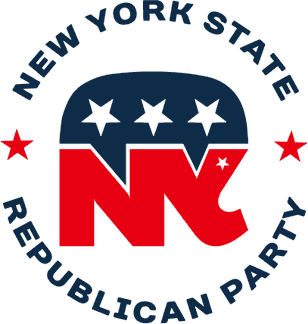Political party strength in New York may refer to:
Political party strength in New York may refer to:

The 1848 United States presidential election was the 16th quadrennial presidential election, held on Tuesday, November 7, 1848. In the aftermath of the Mexican–American War, General Zachary Taylor of the Whig Party defeated Senator Lewis Cass of the Democratic Party.

Zhao Ziyang was a Chinese politician. He was the third premier of the People's Republic of China from 1980 to 1987, vice chairman of the Chinese Communist Party (CCP) from 1981 to 1982, and CCP general secretary from 1987 to 1989. He was in charge of the political reforms in China from 1986, but lost power in connection with the reformative neoauthoritarianism current and his support of the 1989 Tian'anmen Square protests.
Strength may refer to:

The 1988 Democratic National Convention was held at The Omni in Atlanta, Georgia, from July 18 to 21, 1988, to select candidates for the 1988 presidential election. At the convention Governor Michael Dukakis of Massachusetts was nominated for president and Senator Lloyd Bentsen of Texas for vice president. The chair of the convention was Speaker of the U.S. House of Representatives Jim Wright.
Montana Democratic Party (MDP) is the affiliate of the Democratic Party in the U.S. state of Montana and one of the two major political parties in the state. The party as of 2021 is chaired by Robyn Driscoll. The National Committeeman is Jorge Quintana, and the National Committeewoman is Jean Lemire Dahlman.
Negative campaigning is the process of deliberately spreading negative information about someone or something to worsen the public image of the described. A colloquial, and somewhat more derogatory, term for the practice is mudslinging.

The 1996 Republican National Convention convened at the San Diego Convention Center (SDCC) in San Diego, California, from August 12 to August 15, 1996. The convention nominated former Senator Bob Dole from Kansas, for president and former Representative and secretary of Housing and Urban Development Jack Kemp, from suburban Buffalo, New York, for vice president.

Earl Russell Browder was an American politician, spy for the Soviet Union, communist activist and leader of the Communist Party USA (CPUSA). Browder was the General Secretary of the CPUSA during the 1930s and first half of the 1940s. During World War I, Browder served time in federal prison as a conscientious objector to conscription and the war. Upon his release, Browder became an active member of the American Communist movement, soon working as an organizer on behalf of the Communist International and its Red International of Labor Unions in China and the Pacific region.

The three-component theory of stratification, more widely known as Weberian stratification or the three class system, was developed by German sociologist Max Weber with class, status and party as distinct ideal types. Weber developed a multidimensional approach to social stratification that reflects the interplay among wealth, prestige and power.

Political party strength in U.S. states is the level of representation of the various political parties in the United States in each statewide elective office providing legislators to the state and to the U.S. Congress and electing the executives at the state and national level.
An independent voter, often also called an unaffiliated voter or non-affiliated voter in the United States, is a voter who does not align themselves with a political party. An independent is variously defined as a voter who votes for candidates on issues rather than on the basis of a political ideology or partisanship; a voter who does not have long-standing loyalty to, or identification with, a political party; a voter who does not usually vote for the same political party from election to election; or a voter who self-describes as an independent.

The 2006 United States Senate election in New York was held on November 7, 2006. Incumbent Democratic U.S. Senator Hillary Clinton won re-election to a second term in office, by a more than two-to-one margin. Clinton was challenged by Republican John Spencer, the former mayor of Yonkers. Longtime political activist Howie Hawkins of the Green Party also ran a third-party campaign.

The 1952 Democratic National Convention was held at the International Amphitheatre in Chicago, Illinois from July 21 to July 26, 1952, which was the same arena the Republicans had gathered in a few weeks earlier for their national convention from July 7 to July 11, 1952. Four major candidates sought the presidential nomination: U.S. Senator Estes Kefauver of Tennessee, Governor Adlai Stevenson II of Illinois, Senator Richard Russell of Georgia and Averell Harriman of New York.

The Lushan Conference was a meeting of the top leaders of the Chinese Communist Party (CCP) held between July and August 1959. The CCP Politburo met in an "expanded session" between July 2 and August 1, followed by the 8th Plenum of the CCP Eighth Central Committee from August 2–16. The major topic of discussion was the Great Leap Forward.

The New York Republican State Committee, established in 1855, is the New York State affiliate of the United States Republican Party (GOP). The party has headquarters in Albany, Buffalo, and New York City. The purpose of the committee is to nominate Republican candidates for election to New York and federal political roles. It also assists its nominees in their election campaigns.

The ninth legislative assembly election of Tamil Nadu was held on 21 January 1989. Dravida Munnetra Kazhagam (DMK) won the election and its leader M. Karunanidhi, became the Chief Minister. It was his third term in office. The DMK was in power only for a short term, as it was dismissed on 31 January 1991 by the Indian Prime minister Chandra Shekhar using Article 356 (Otherwise) of the Indian Constitution.

The 184th New York State Legislature, consisting of the New York State Senate and the New York State Assembly, met from January 7, 1981, to December 31, 1982, during the seventh and eighth years of Hugh Carey's governorship, in Albany.

The 185th New York State Legislature, consisting of the New York State Senate and the New York State Assembly, met from January 5, 1983, to December 31, 1984, during the first and second years of Mario Cuomo's governorship, in Albany.

The 1871 Kentucky gubernatorial election was held on August 7, 1871. Incumbent Democrat Preston Leslie defeated Republican nominee John Marshall Harlan with 58.61% of the vote.